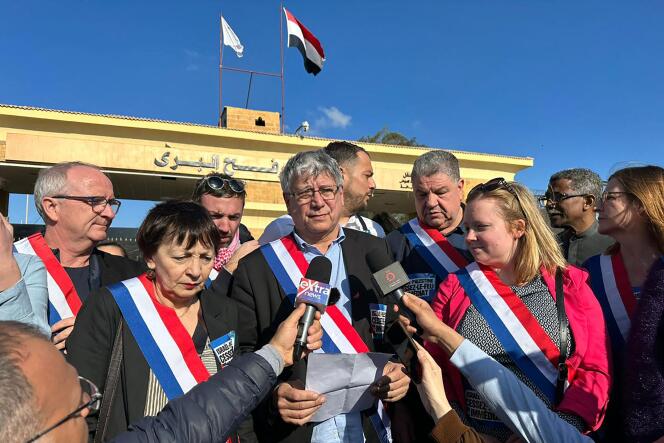


In the middle of the desert, the Rafah border post separates Egypt from the Gaza Strip. Behind iron gates, after a buffer zone several kilometers long, lies the enclave's last city, and the hell of war. On Sunday, February 4, a delegation of 15 French left-wing lawmakers visited the border of the Palestinian territory. Wearing their tricolor scarves, they called for an "immediate and permanent ceasefire" in the region, through the voice of MP Eric Coquerel of La France Insoumise (LFI, radical left).
The day before, Rafah was the target of bombardments. After denouncing them, the president of the Assemblée Nationale's Finance Committee declared that the "massacres" committed by Hamas on October 7 could not "justify the deaths of 27,000 Palestinians." The figure comes from the Hamas-run health ministry, which announced on Sunday that 27,365 people have been killed in the Gaza Strip since the start of the war between Israel and the Palestinian Islamist movement.
The moment was broadcast live on social media. In the sky above, the hum of a drone betrayed the presence of the Israeli army. The border crossing, officially closed to the Gazan population, was bustling with activity. Only a few pallets of equipment or foodstuffs and one or two ambulances crossed the wall.
Coquerel had planned the trip in support of Palestinians since December. But getting Egypt's permission to cross Sinai, the militarized zone that leads to the border, was no mean feat. The LFI politician pointed to the International Court of Justice (ICJ) ruling on January 26, calling on Israel to prevent any possible acts of "genocide." This, he believed, makes the demand for a ceasefire even more legitimate.
The bulk of the delegation was made up of LFI lawmakers, including Ersilia Soudais, the vice president of the Assemblée Nationale's study group on anti-Semitism, and her colleague Thomas Portes, never short of superlatives to denounce the actions of the Israeli army, which he likened to a "genocide." The MPs said they came to "relay the thousands of voices that have mobilized throughout France," referring to the demonstrations in support of the Palestinian people organized every Saturday since the fall.
Since the terrorist attack on October 7, LFI has positioned itself as the only party "with a clear discourse on this subject," according to Coquerel. In recent weeks, the founder of the party, Jean-Luc Mélenchon, has been surprisingly active. After a trip to The Hague on January 11, where he attended the ICJ hearings, and another to Lebanon on January 16 in the wake of the killing of Hamas's number two by an Israeli strike, the three-time presidential candidate went to Geneva on February 3, in front of UN headquarters to "protest and demand" a "ceasefire." For a long time, the leader of LFI kept his distance from the Middle East. But the Palestinian cause particularly resonates in working-class neighborhoods, where LFI has large electoral strongholds. "The question of cultural colonialism is very present there. People say to me, 'thank goodness you're here, hang in there'," said Coquerel, denying any electoral ulterior motive.
You have 60% of this article left to read. The rest is for subscribers only.
